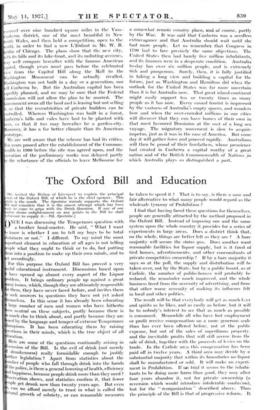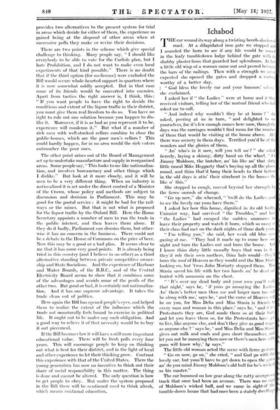The Oxford Bill and Education
[we invited the Bishop of Liverpool to explain the principal dots of the Oxford Bill, of which he is the chief sponsor. This rtiele is the result. The Spectator warmly supports the Oxford It and considers that it, is the sanest attempt which has been mlc to come to grips with the Drink Question. If any of our stlors desire enlightenment, on any points in the Bill we shall cleavour to supply it.--Ed. Spectator.] NCE I was discussing the Temperance question with a brother head-master. He said, " What I want know is whether I am to tell my boys to be total bstainers or not." I differed. To my mind the most iportant clement in education at all ages is not telling ople what they ought to think or to do, but putting em into a position to make up their own minds, and to t accordingly. For this purpose the Oxford Bill has proved a very .eful educational instrument. Discussions based upon have opened up almost every aspect of the Liquor roblem. It brings ordinary people up against a great any issues, which, though they are ultimately responsible r them, they have never faced before, and invites them seek answers to questions they have not yet asked emselves. In this sense it has already been educating large number of men and women who have hitherto en neutral on these subjects, partly because there is much else to think about, and partly because they are red by the language and temper of extreme Temperance ampions. It has been educating them by raising uestions in their minds, which is the true object of all location.
Re.re are some of the questions continually arising in seussion of the Bill. Is the evil of drink (not merely drunkenness) really formidable enough to justify ether legislation ? Apart from statistics about the Mier of people who fall through drink into the hands the police, is there a general lowering of health, efficiency d happiness, because people drink more than they need ? hservatio.nshows, and statistics confirm it, that fewer pie get drUnk now than twenty years ago. But even can we-afford merely. to trust in what is called the tural growth of sobriety, or can reasonable measures be taken to speed it ? That is to say,. is there a sane and fair alternative to what many people. would regard as the wholesale tyranny of Prohibition ?
I find that having faced these questions for themselves, people are generally attracted by the method proposed in the Oxford Bill. Instead of imposing one and the same system upon the whole country it provides for a series of experiments in large areas. Does a district think that, on the whole, things arc better left as they arc ? A hare majority will secure the status quo. Does another want reasonable facilities for liquor supply, but is it tired of tied, houses, advertisements, and other concomitants of private competitive ownership ? If by a hare majority it says so at the poll, the supply and distribution will be taken over, not by the State, but by a public board, as at Carlisle, the number of public-houses will probably he reduced, the remainder much improved, and the whole business freed front the necessity of advertising, and from that other worse necessity of making its influence felt in local and other polities.
The result will be that everybody will get as much beer and spirits as he likes, and as easily as before, but it will be to nobody's interest to see that as much as possible is consumed. Meanwhile all who have lost employment or profit receive compensation on a more generous scale than has ever been offered before, not at the public expense, but out of the sales of superfluous property, and the inevitable profits that will still accrue from the sale of drink, together with the proceeds of levies on the trade. In the Carlisle area this compensation has been paid off in twelve years. A third area may decide by a substantial majority that within its boundaries no liquor shall be manufactured or sold. It will make an experi- ment in Prohibition. If on trial it seems to the inhabi- tants to be doing more harm than good, they may after four years abandon it, not for private ownership (a reversion which would introduce intolerable confus:on), but for the " reorganization " described• above. Thus the principle of the Bill is that of progressive reform. It provides two alternatives to the present system for trial in areas which decide for either of them, the experience so gained being at the disposal of other areas when at successive polls they make or revise their decisions.
There arc two points in the scheme which give special challenge to thinking. Many people say, " I should like everybody to be able to vote for the Carlisle plan, but I hate Prohibition, and I do not want to make even local experiments of that kind possible." There is no doubt that if the third option (for no-licence) were excluded the Bill would secure whole-hearted support in quarters where it is now somewhat coldly accepted. But in that case some of its friends would be converted into enemies. Apart from tactics the right answer is, I think, this : " If you want people to have the right to decide the conditions and extent of the liquor traffic in their district, you must give them real freedom to do so. You have no right to rule out one solution because you happen to dis- like it. Moreover, if it is as bad as you represent it to be, experience will condemn it." But what if a number of rich men with well-stocked cellars combine to close the public-houses, which arc the poor men's cellars ? This could hardly happen, for in no area would the rich voters outnumber the poor ones.
The other point arises out of the Board of Management set up to undertake manufacture and. supply in reorganized areas. Some people say," This looks tome like nationaliza- tion, and involves bureaucracy and other things which I dislike." But look at it more closely, and it will be seen to be a very different thing. When an industry is nationalized it is set under the direct control of a Minister of the Crown, whose policy and methods are subject to discussion and decision in Parliament. This may be good for the postal service ; it might be bad for the rail- ways or the mines. But that is not what is proposed for the liquor traffic by the Oxford Bill. Here the Home Secretary appoints a number of men to run the trade in the public interest, and then leaves them alone. If they do it badly, Parliament can dismiss them, but other- wise it has no concern in the business. There could not be a debate in the House of Commons on the price of beer. Now this may be a good or a bad plan. It seems clear to me that it has some very good points. It is already being tried in this country (and I believe in no other) as a third alternative standing between private competitive owner- ship and State Socialism. And the experience of Harbour and Water Boards, of the and of the Central Electricity Board seems to show that it combines some of the advantages and avoids sonic of the perils of the other two. But good or bad, it is certainly not nationaliza- tion. And it has one supreme advantage. It takes the trade clean out of politics.
Here again the Bill has opened people's eyes, and helped them to realize the extent of the influence which the trade not unnaturally feels bound to exercise in political life. It ought not to be under any such obligation. And a good way to relieve it of that necessity would be to buy it out piecemeal.
If the Bill becomes law it will have a still more important educational value. There will be fresh polls every four years. This will encourage people to keep on thinking out what is best for their district, and in the light of local and other experience to let their thinking grow. Contrast this experience with that of the United States. There the young generation has now no incentive to think out their share of social responsibility in this matter. The thing is done and cannot be altered. The only question is how to get people to obey. But under the system proposed in the Bill there will be ecatinued need to think afresh, which means continual education.



























































 Previous page
Previous page